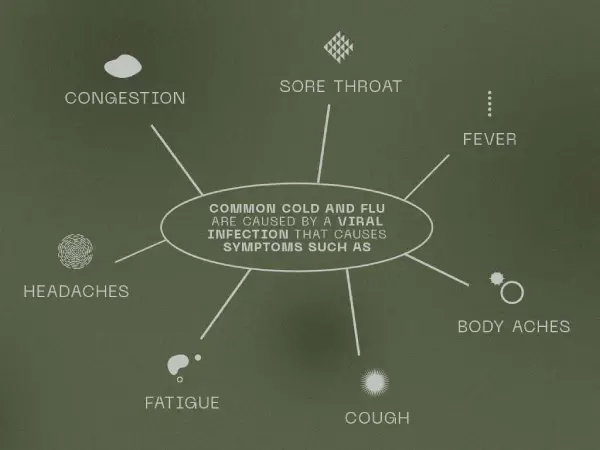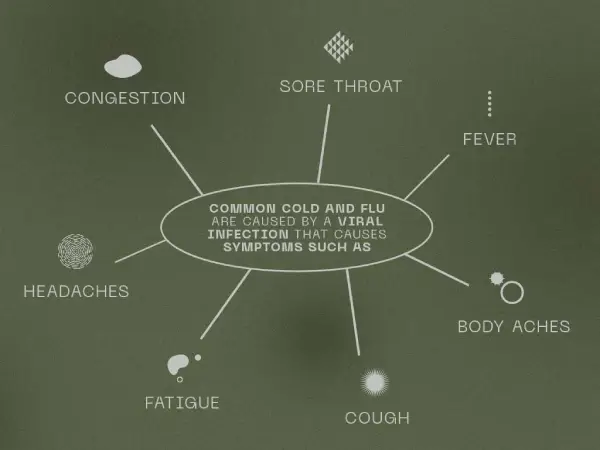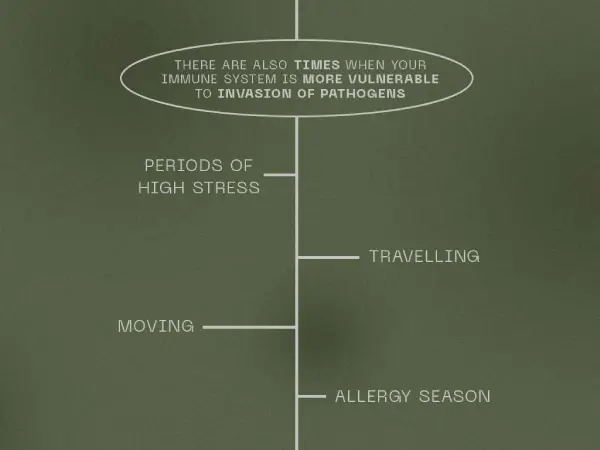Blog
Fighting Off the Common Cold During Cold and Flu Season

As we enter cold and flu season, it is very important to start thinking about how to best care for our immune system to resist or resolve sickness. Let’s start by learning more about the immune system itself and then explore the ways in which we can strengthen, support, and boost it!
What is the immune system and how does it work?
The immune system is one of the 11 systems of the body. Although all the body systems are connected, each has its own distinct role to play. The immune system’s main role is protection. It protects us against harm from things outside of the body (like disease-causing bacteria, viruses, or other pathogens) and from things inside of the body (like toxins in the blood or abnormal activity of cells).
The immune system is made up of a complex network of special organs, vessels, tissues, cells, and proteins that work together as the body’s immune surveillance team. There are two types of immunity; innate and adaptive immunity, each of which responds in different ways to fight off pathogens.
The innate immune response is our first line of defense against germs entering and taking hold in the body. For example, the skin and mucous membranes create a physical barrier that keeps germs out; the stomach produces acid that inhibits germ overgrowth; the tears and saliva contain enzymes that destroy germs; and the respiratory tract secretes mucous that washes germs out. Another example are certain cells, like macrophages or natural killer cells, that can fight pathogens that have already entered the body.
The adaptive immune response is a more specialized line of defense inside the body. It uses special cells known as lymphocytes: B cells and T cells. B cells create antibodies against a wide variety of pathogens. T cells prefer directly killing cancerous and virally infected cells. The adaptive immune system takes longer to work; however, it can target specific invaders and remember the process so that it can mount a quicker and stronger attack in the future.
Isn’t the immune system amazing? So, if your eyes are watery, your nose is runny, or you’re feeling feverish, your body is probably working to fight something off – maybe the common cold or flu. Both the common cold and flu are caused by a viral infection that causes symptoms such as congestion, sore throat, cough, body aches, headaches, fatigue, and fever. The common cold is usually mild whereas the flu may lead to more serious complications, like pneumonia in at risk populations such as young children, the elderly, and people with certain conditions (like diabetes, heart disease, or asthma).
Why is the immune system important and how can we support it?
We need a healthy immune system to maintain resilience against illness throughout the seasons and our lives! Without our immune system we would constantly be getting sick. It is normal to get sick every once in a while, in fact, this shows us that our immune system is strong enough to mount a proper immune response.
However, getting sick often or developing serious sickness from something like the cold or flu may be a sign of a weakened immune system. How easily we prevent and recover from illness is a good reflection of the strength of our immune system.
The immune system can become weakened by several factors including chronic illness or infection, certain medications, heavy alcohol or drug use, smoking, nutrient deficiencies, a lack of sleep or exercise, anxiety or grief, low intake of fruits and vegetables, little time spent outdoors, and more.
There are also times when your immune system is more vulnerable to invasion of pathogens, such as in periods of high stress, traveling, moving, or allergy season. These are perfect times to schedule an immune-supportive IV at LIVV to support you through the process!
As you can see, our immune system is highly influenced by environmental and lifestyle factors. While our immune system can be weakened, it can also be strengthened by making healthy choices and living mindfully.
When it comes to caring for the immune system, the goal is to strengthen it to prevent illness, support it in daily living, and boost it when illness occurs. Important pieces of this include decreasing baseline inflammation in the body (inflammation impairs immunity and infection increases oxidative stress and damage) and promoting the function of white blood cells (AKA immune cells that fight off pathogens).
How can LIVV help boost your immune system during cold and flu season?
The immune system, like the other systems, requires many nutrients to function. Most of these nutrients can come from a healthy diet, though sometimes we need higher amounts than the diet alone can provide, especially in times of sickness. This is where supplementation and IV therapy are best used.
IV therapy is a powerful way of getting nutrients into the body. Since it skips the digestive system, your body receives 100% of the nutrients infused. IV infusions are especially beneficial if you have an immune disorder, a weakened or vulnerable immune system, or a current seasonal sickness. LIVV is proud to offer 2 different IVs that enhance immunity and protect cellular health:
The Cold Buster IV: this IV is specially formulated to fight the common cold but is also helpful for other seasonal ailments like the flu and infections of the ear or sinuses. Benefits include support for liver detoxification, fighting oxidative stress, reducing mucus formation and cough, and enhancing white blood cell function.
Ingredients: vitamin C, poly MVA (ALA, NAC, B vitamins, carnitine, taurine)
The Immune IV: this IV is beneficial for autoimmune diseases, cancer, chronic infections like Lyme disease and EBV, diabetes, and the common cold and flu. The Cold Buster nutrients can be added to this bag if you are sick with the cold or flu.
Ingredients: vitamin C, B vitamins, magnesium, calcium, potassium, bicarbonate, selenium, zinc, amino acids
Let’s talk about the power of these nutrients and why we’ve chosen to include them in our IV immune-supporting formulas:
Vitamin C is a potent antioxidant and is essential to the immune system in a multitude of ways, such as promoting immune cell function to kill pathogens. Vitamin C supplementation has been shown to prevent and treat respiratory infections. Vitamin C deficiency can decrease immunity and increase the risk of infection. Did you know that during infection, the body requires higher amounts of vitamin C and can absorb vitamin C at a higher rate?
B vitamins are involved in every aspect of generating energy within cells! This means they can help combat the fatigue that comes with being sick. They are especially beneficial when given as a complex since they work synergistically with each other in the body.
Zinc is crucial for the function of essentially all immune cells! It has strong antiviral and anti-inflammatory properties. Zinc deficiency greatly impairs immune function and increases the risk of infection. Zinc supplementation has been shown to increase resistance to viral infections and reduce the length of the common cold.
Selenium is a strong antioxidant and has been shown to enhance immune function. It also has antiviral properties and is used in the prevention and treatment of several immune-related disorders.
Electrolytes are minerals and ions such as magnesium, calcium, potassium, and bicarbonate. They are important for hydrating and alkalizing the body, as well as for the health of muscle, nerve, blood, and damaged tissue.
Alpha lipoic acid (ALA) is important for mitochondrial health (AKA energy production) and has antioxidant activity. It has been shown to regulate the immune system and is used in the treatment of several autoimmune diseases.
N-acetyl cysteine (NAC) is the precursor to glutathione, which is the body’s master antioxidant. NAC has antiviral and anti-inflammatory properties and is beneficial for improving respiratory tract immunity. It helps reduce mucous, break it up, and clear it from the body, which helps wash pathogens out of the body.
Amino acids are the building blocks of protein. Carnitine and taurine in combination provide benefits for mitochondrial health (AKA energy production), heart health, mood and mental clarity, body fatigue, and immune boosting!
What are the key elements of a healthy immune system?
Optimal vitamin D: vitamin D is one of the most important nutrients for the immune system. It helps immune cell formation and has been shown to reduce the risk of acute respiratory infection. Vitamin D deficiency is very common and can impair immune function and promote inflammation. Vitamin D is a fat-soluble vitamin, which means it can become toxic if supplemented in excess. We highly recommended working with your ND at LIVV to optimize your levels!
Optimal vitamin A: vitamin A was once known as the “anti-infective vitamin” because its status is a major determinant of overall immune status. Vitamin A deficiency increases inflammation, risk of infection, and respiratory conditions. It is important for immune cell function and mucosal linings of the respiratory and gastrointestinal tracts. Vitamin A is a fat-soluble vitamin, which means it can become toxic if supplemented in excess. Talk to your ND at LIVV for supplement recommendations during sickness!
Omega 3 fats: are essential fats (EPA and DHA) that are very important for the health of our cells. They are well-known for reducing inflammation in the body, in addition to many other functions. Talk to your naturopathic doctor at LIVV for food sources or supplementation!
Healthy gut: did you know that the gut contains 70-80% of the body’s immune cells? Probiotics help promote the growth of beneficial bacteria in the gut to enhance digestion (needed for nutrient absorption) and immune function (gut bacteria can inactivate and kill pathogens). Talk to your ND at LIVV for food sources or supplementation!
Herbal medicine: many herbs have antiviral and anti-inflammatory properties, such as echinacea. Many are also immunomodulatory, meaning they can adjust the immune response based on the body’s needs. Herbs can be used in the prevention and treatment of sickness and immune related disorders. Ask your ND at LIVV about which herbs can best support you!
Nutritious, balanced diet: try to eat lots of anti-inflammatory food such as colorful fruits and vegetables, omega 3 fats, probiotic-rich foods, and high-quality protein (your body needs protein to build immune cells from!). Try to limit or avoid pro-inflammatory food such as refined carbohydrates, ultra-processed foods, and added sugars. Did you know, research has found that excess sugar in the body can directly impair immune function?
Adequate Hydration: stay hydrated with 2-3 liters of water per day, or at least half of your body weight in ounces per day, to help flush out waste, toxins, and pathogens. Talk to your ND at LIVV for tips on how to improve your hydration status and make drinking water easier!
Quality sleep: 7 or more hours of sleep is recommended for adults per night, less than this may impair immunity. To ensure high quality sleep, reduce caffeine intake in the afternoon and avoid screen time and artificial lighting before bed. Talk to your ND at LIVV for lifestyle hacks to improve your sleep!
Stress management: high and chronic stress can impair immunity. Manage your stress with daily relaxation activities such as deep breathing, bathing, journaling, yoga, music, mindfulness, or meditation. Talk to your ND at LIVV about recommendations for adaptogens and calming herbs that can help!
Regular Exercise: move your body enough to break a sweat every day, try to do this outside where you can be in nature with sunlight and fresh air. This increases vitamin D levels, oxygenation, and circulation, all of which support immunity. Talk to your ND at LIVV for a personalized exercise regimen!
Good Hygiene: wash your hands regularly and avoid touching your mouth, eyes, and nose to prevent germs from entering the body. Consider using hand sanitizer and disinfecting your dirty surfaces as needed. Talk to your ND at LIVV for more specific ways to increase cleanliness in your home!
Positive Mindset: maintain a positive mindset about yourself and your health. Many studies have proven the connection between our mental health and our physical health. Believe and affirm yourself that you are healthy and strong enough to heal. Talk to your ND at LIVV for motivational support!
For further guidance and individualized protocols to build up your immune system, make an appointment with one of our naturopathic doctors at LIVV. Your treatment plan may include a combination of diet, lifestyle, supplementation, and additional therapeutics based on your health status and goals.
Written by Jordan Valdez, RDN
References:
Hechtman, L. (2019). Clinical naturopathic medicine. Elsevier.
Secor, E., Secor, A. the A. E., & Secor, E. (n.d.). The immune system: An integrative perspective. Natural Medicine Journal. Retrieved October 24, 2021, from https://www.naturalmedicinejournal.com/journal/2016-10/immune-system-integrative-perspective.
Introduction to the immune system | osmosis. (n.d.). Retrieved October 24, 2021, from https://www.osmosis.org/learn/Introduction_to_the_immune_system.
Disorders of the immune system. Johns Hopkins Medicine. (n.d.). Retrieved October 24, 2021, from https://www.hopkinsmedicine.org/health/conditions-and-diseases/disorders-of-the-immune-system.
Centers for Disease Control and Prevention. (2017, March 2). CDC – how much sleep do I need? – sleep and sleep disorders. Centers for Disease Control and Prevention. Retrieved October 24, 2021, from https://www.cdc.gov/sleep/about_sleep/how_much_sleep.html.
Centers for Disease Control and Prevention. (2021, September 16). Cold versus flu. Centers for Disease Control and Prevention. Retrieved October 24, 2021, from https://www.cdc.gov/flu/symptoms/coldflu.htm.
Mayo Foundation for Medical Education and Research. (2021, June 11). Common cold. Mayo Clinic. Retrieved October 24, 2021, from https://www.mayoclinic.org/diseases-conditions/common-cold/symptoms-causes/syc-20351605.
InformedHealth.org [Internet]. Cologne, Germany: Institute for Quality and Efficiency in Health
Care (IQWiG); 2006-. What are the organs of the immune system? [Updated 2020 Jul 30]. Available from: https://www.ncbi.nlm.nih.gov/books/NBK279395/
InformedHealth.org [Internet]. Cologne, Germany: Institute for Quality and Efficiency in Health
Care (IQWiG); 2006-. The innate and adaptive immune systems. [Updated 2020 Jul
30]. Available from: https://www.ncbi.nlm.nih.gov/books/NBK279396/
Yanuck, S. F., Pizzorno, J., Messier, H., & Fitzgerald, K. N. (2020). Evidence Supporting a Phased
Immuno-physiological Approach to COVID-19 From Prevention Through Recovery. Integrative medicine (Encinitas, Calif.), 19(Suppl 1), 8–35.
Gaby, A. R. (2017). Nutritional medicine. Fritz Perlberg Publishing.
Wei Liu, Lian-jie Shi, Sheng-guang Li, “The Immunomodulatory Effect of Alpha-Lipoic Acid in
Autoimmune Diseases”, BioMed Research International, vol. 2019, Article
ID 8086257, 11 pages, 2019. https://doi.org/10.1155/2019/8086257
Shomali, N., Mahmoudi, J., Mahmoodpoor, A., Zamiri, R. E., Akbari, M., Xu, H., &
Shotorbani, S. S. (2021). Harmful effects of high amounts of glucose on the
immune system: An updated review. Biotechnology and applied biochemistry, 68(2), 404–410. https://doi.org/10.1002/bab.1938




